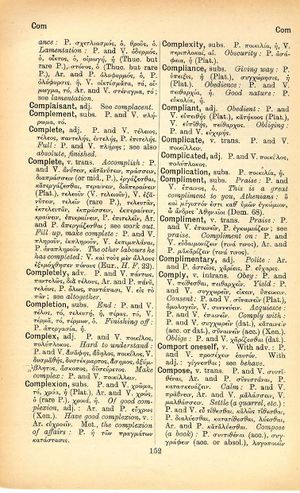complex: Difference between revisions
Ἰατρὸς ἀδόλεσχος ἐπὶ τῇ νόσῳ νόσος → Medicus loquax, secundus aegro morbus est → Ein Arzt, der schwätzt, verdoppelt nur der Krankheit Last
m (Text replacement - "link={{" to "link={{") |
m (Text replacement - "}}]]" to "}}]]") |
||
| Line 1: | Line 1: | ||
{{Woodhouse1 | {{Woodhouse1 | ||
|Text=[[File:woodhouse_152.jpg|thumb | |Text=[[File:woodhouse_152.jpg|thumb | ||
|link={{filepath:woodhouse_152.jpg | |link={{filepath:woodhouse_152.jpg}}]]'''adj.''' | ||
P. and V. [[ποικίλος]], [[πολύπλοκος]]. | P. and V. [[ποικίλος]], [[πολύπλοκος]]. | ||
Revision as of 10:11, 15 August 2017
English > Greek (Woodhouse)
adj.
P. and V. ποικίλος, πολύπλοκος.
Hard to understand: P. and V. ἀσαφής, ἄδηλος, ποικίλος, V. δυσμαθής, δυστέκμαρτος, ἄσημος, ἀξύμβλητος, ἄσκοπος, δυσεύρετος.
Make complex: P. and V. ποικίλλειν.
Latin > English (Lewis & Short)
complex: plĭcis, adj. complico,
I closely connected with one, confederate, participant (late Lat.): dii consentes et complices, i. e. agreeing, Arn. 3, p. 123 (v. consentes).— With gen., Cod. Th. 6, 4, 21; Ambros. Off. 3, 4; Prud. Ham. 614.
Latin > French (Gaffiot 2016)
complex, ĭcis (cum, plico), adj., uni, joint : complex honestatis est utilitas Ambr. Off. 3, 4, l’honnête et l’utile se tiennent ; dii complices Arn. 3, 40, les douze grands dieux, v. Consentes dii || complice : Sid. Ep. 8, 11 || qui a des replis, tortueux : Prud. Ham. 614.
Latin > German (Georges)
complex, plicis (com u. plico), mit jmd. od. etw. eng verbunden, der Verbündete, der Teilnehmer, auch m. Genet., Eccl. u. spät. ICt. (auch Anonym. Orest. trag. 677): di, einstimmige (= Consentes), Arnob. 3, 40.

